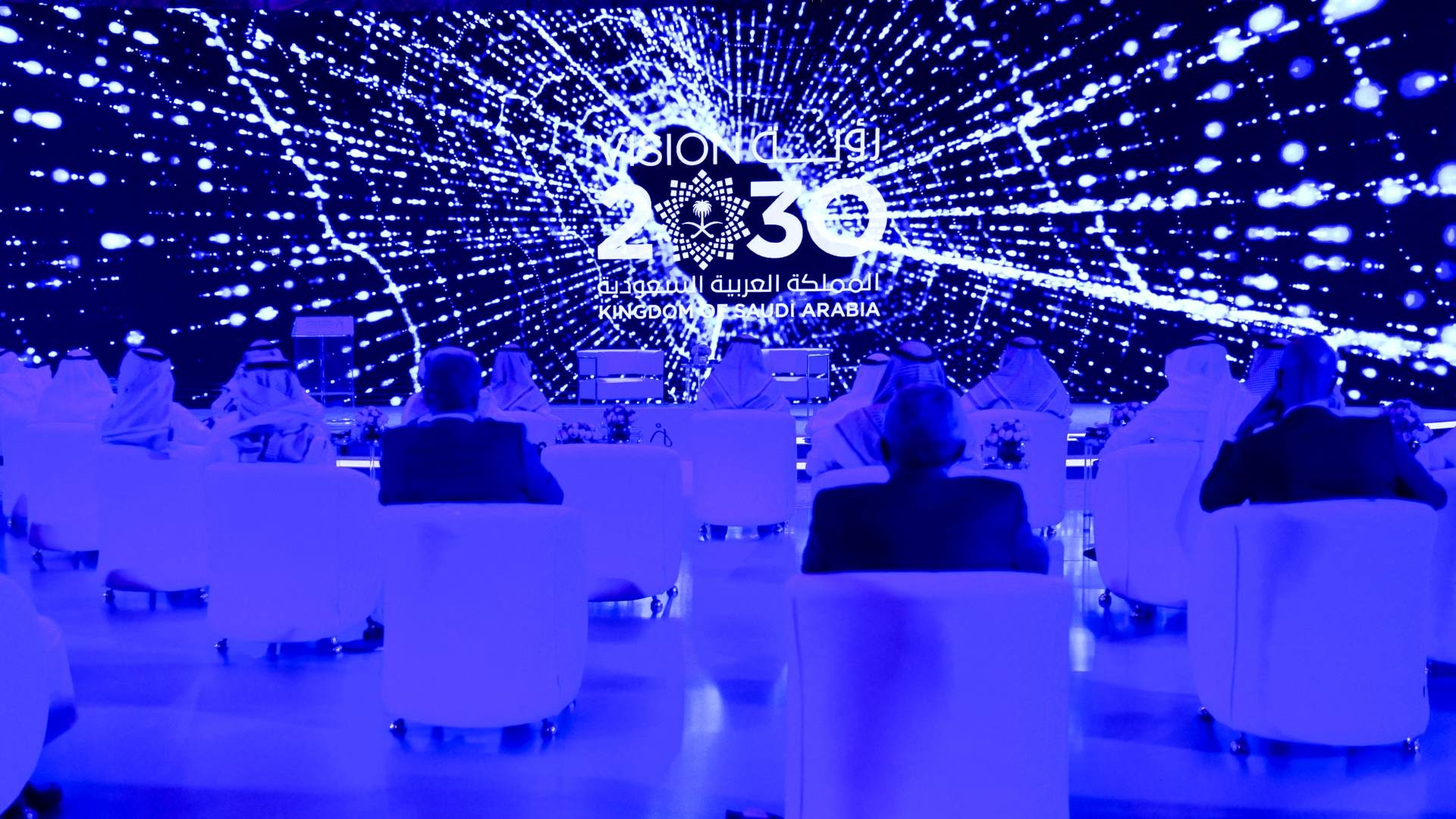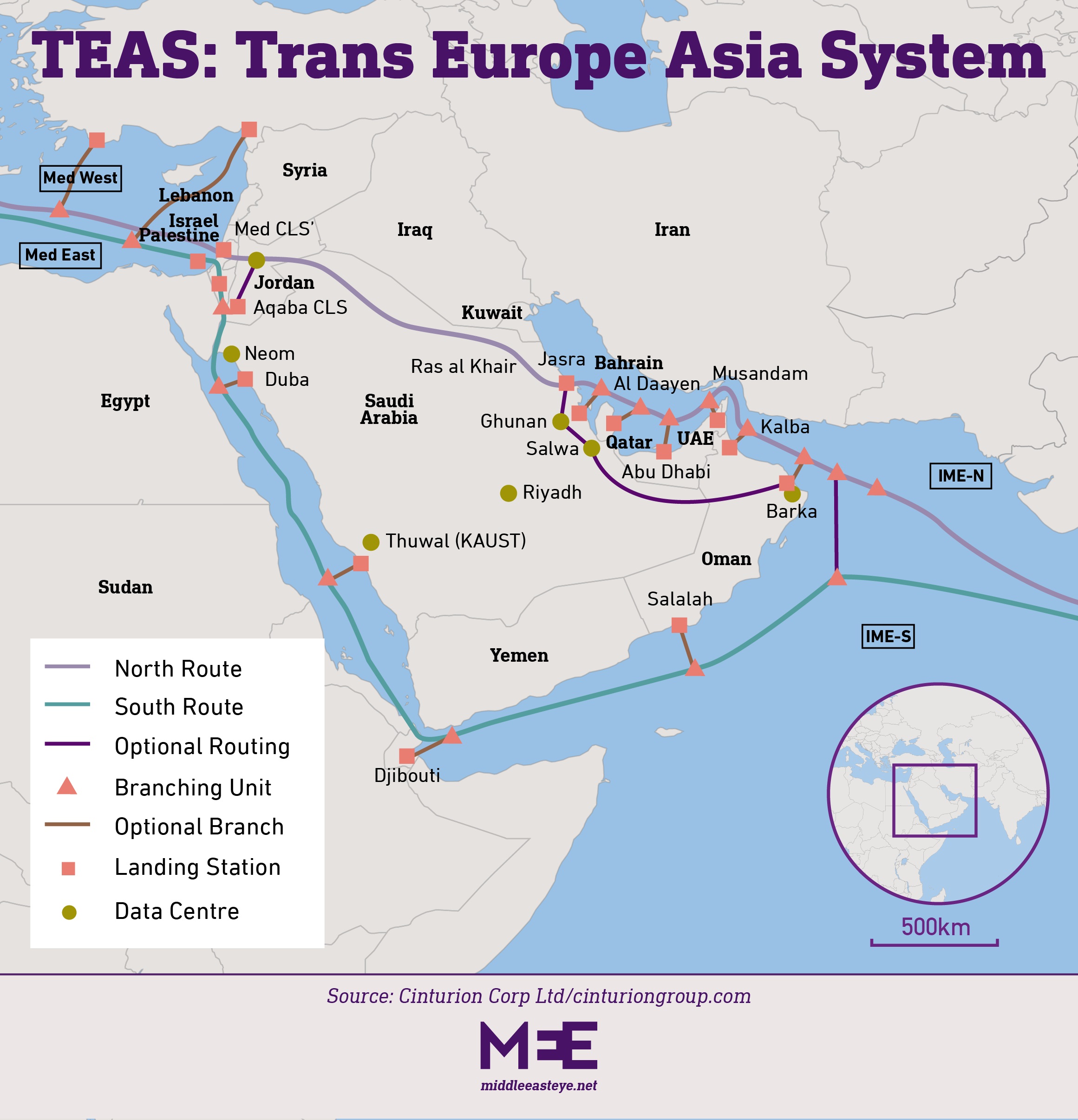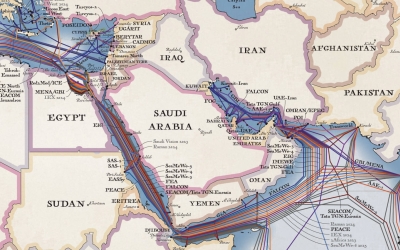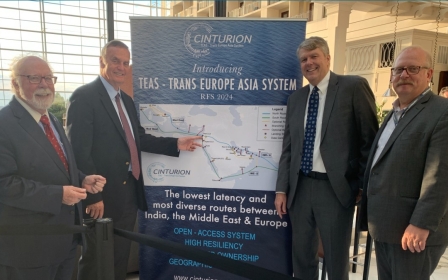UAE landing station confirmed for fibre optic cable set to link Israel to Gulf states

An agreement to land a proposed fibre optic cable running between India and Europe in the United Arab Emirates has highlighted how Gulf states and Israel are positioning themselves as potential partners on projects to develop new regional trade and connectivity routes.
The 20,000-kilometre project, known as the Trans Europe Asia System (TEAS), would link Mumbai to Marseille via submarine cables and a terrestrial segment crossing the Arabian Peninsula.
On Wednesday, Cinturion, the company behind the project, announced it had signed a memorandum of understanding with the Emirates Integrated Telecommunications Company, known as "du", to build a landing station in the UAE.
Middle East Eye has previously reported how Cinturion, an industry newcomer, is being backed by a major Israeli infrastructure investment fund, Keystone.
The announcement comes as Middle Eastern leaders and the G20 have floated the idea of building new routes between India and Europe as a possible benefit of a touted normalisation deal between Israel and Saudi Arabia.
In early September, Israeli Prime Minister Benjamin Netanyahu said that, following talks with the Cypriot government, there was a “possibility of making real the idea of an Asia-Middle East-Europe corridor”.
Netanyahu added: “An example of the most obvious one is a fibre optic connection. That's the shortest route. It's the safest route. It's the most economic route.”
A week later, the India-Middle East-Europe Economic Corridor (IMEC) was announced at the G20 summit in New Delhi.
The IMEC is intended to bolster connectivity and economic integration between Asia, the Gulf, and Europe, and includes the proposed laying of new fibre optic cables for digital connectivity along a route similar to the one earmarked for TEAS.
This week, Saudi Arabia’s Crown Prince Mohammed bin Salman also highlighted the logistical importance of the G20 plan and fibre optic cables in an interview with Fox News.
“It's not only about moving goods and building railways and ports. It's about linking grids, energy grids, data cables and other stuff that will benefit Europe, the Middle East and India... It's a big deal for us, Europe and India,” he said.
Bypassing Egypt
Cable companies have been keen to establish new routes through the Middle East over the past 15 years to avoid the stranglehold that Egypt and state-owned Telecom Egypt (TE) holds over the industry, according to Michael Ruddy, director of international research at US-based Terabit Consulting.
Currently, all fibre optic cables that run through the region, connecting Europe with Asia, pass through the Red Sea and across Egypt, handling an estimated 17 to 30 percent of all global internet traffic.
“The Red Sea is one of the top four trans-oceanic routes in terms of volume, and connecting hubs, from Tokyo and Shanghai to Singapore and on to Europe,” said Ruddy.
“There’s a lot of sensitive traffic - financial data and from data centre to data centre - with a lot of demand on that route. And there’s not a lot of great alternatives right now.”
The TEAS cable is not the only proposed project under development that aims to bypass Egypt.
In 2021, Google announced plans for a $400 million cable between Europe and Asia known as Blue-Raman running through Israel, Jordan and Saudi Arabia.
“TEAS and Blue-Raman are both really quite urgently needed by the industry in terms of trying to provide an alternative to Egypt,” said Ruddy.
Cinturion’s deal to build a landing station in the UAE follows an earlier agreement in July to build a landing station for a southern branch of the TEAS network near Jeddah on Saudi Arabia’s Red Sea coast.
Israeli involvement in the project remains rather ambiguous, however, with no reference to Keystone’s investment on Cinturion’s website.
On its own website, Keystone describes itself as holding 25 percent of shares in the TEAS project.
Announcing its investment in 2021, Keystone CEO Navot Bar was quoted as saying that partners included: “Former senior officers in the US Army, British investors, and investors from the Gulf states and Israel."
Cinturion had not responded to questions from MEE at the time of publication about Israeli involvement.
“There are whispers of terrestrial connections between Saudi Arabia and Israel. But there’s a desire to keep it quiet, and that’s probably influencing the tack of TEAS and Blue-Raman,” said Ruddy.
“There’s still a lot of geopolitical sensitivity, and they don’t want to publicise the routings they have.”
Industry players are unsure whether the cables mentioned by Netanyahu or bin Salman in their recent public comments refer to TEAS or Blue-Raman, if at all.
Israel earlier in the year announced plans to turn the country into a regional digital hub by building a fibre optic cable from Ashkelon on the Mediterranean to Eilat on the Red Sea.
The Israeli state-owned energy company Europe-Asia-Pipeline-Co (EAPC) is to build the 254-kilometre cable.
Saudi Arabia meanwhile is investing billions of dollars in data centres and fibre optic cables to turn the kingdom into a regional digital hub.
Seven new cables are to land in Saudi Arabia in the coming three years, adding to the 15 already in operation.
Sources in the submarine cable industry said that getting agreement for multi-jurisdictional projects like TEAS that run between countries that have historic friction, such as Israel and Saudi Arabia, nonetheless remains “extremely challenging”.
Middle East Eye propose une couverture et une analyse indépendantes et incomparables du Moyen-Orient, de l’Afrique du Nord et d’autres régions du monde. Pour en savoir plus sur la reprise de ce contenu et les frais qui s’appliquent, veuillez remplir ce formulaire [en anglais]. Pour en savoir plus sur MEE, cliquez ici [en anglais].






